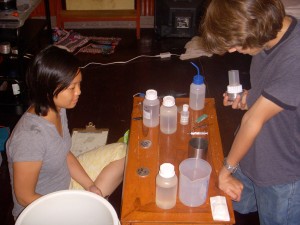
TUSCALOOSA, Ala. — The University of Alabama announced that an interdisciplinary research team has received a $100,000 Grand Challenges Explorations grant from the Bill & Melinda Gates Foundation.
The grant will support an innovative global health research project titled “Novel and Rapid Method for E. coli Detection and Typing.”
UA’s project is one of 78 grants announced by the Gates Foundation in the fourth funding round of Grand Challenges Explorations, an initiative to help scientists around the world explore bold and largely unproven ways to improve health in developing countries. The grants were provided to scientists in 18 countries on six continents.
To receive funding, UA’s team showed in a two-page application how their idea falls outside current scientific paradigms and might lead to significant advances in global health. The initiative is highly competitive, receiving almost 2,700 proposals in this round.
Led by Dr. Joe Brown, assistant professor in New College and biological sciences, the Capstone’s interdisciplinary research group includes Dr. Philip Johnson, associate professor of civil, construction and environmental engineering, and Ynhi Thai, a senior in chemical and biological engineering. The project idea was conceived through work the group performed in Vietnam and Cambodia last summer.
UA’s team will develop a novel, cheap, simple and rapid method for detecting and tracking fecal coliform contamination in drinking water. Current methods require about 18 to 24 hours of powered incubation. In emergency relief and other field applications, a rapid, reliable and field-deployable test to determine drinking water quality is needed. The proposed method represents significant innovation in terms of time, cost per test, and equipment.
According to the World Health Organization, approximately 1.7 million deaths occur each year due to unsafe water and unsanitary hygiene conditions. About 1.5 million deaths are among children under 5, mainly due to diarrheal diseases in developing countries. Reducing the burden of water-related illness requires better monitoring for fecal contamination so that risks can be identified and controlled.
“Currently used tests do not provide rapid feedback on drinking water risks,” explained Brown. “Unlike current bacterial indicator assays that require careful decontamination of equipment followed by 18 to 24 hours for incubation, our novel approach can give results in significantly less time.”
“Existing water testing devices are often bulky and costly at about $3,000 per kit,” said Johnson. “Though effective, kits using incubation hardware may be inconvenient for long-term use in the field because a reliable power supply is required to power the incubator or charge an external battery. Therefore, there is still a need to develop a method that is rapid and simple enough to operate at the lowest possible cost, yet robust enough to provide quality results. These requirements are especially important for field use within developing countries.”
“The winners of these grants show the bold thinking we need to tackle some of the world’s greatest health challenges,” said Dr. Tachi Yamada, president of the Gates Foundation’s Global Health Program. “I’m excited about their ideas and look forward to seeing some of these exploratory projects turn into life-saving breakthroughs.”
New College and biological sciences are part of UA’s College of Arts and Sciences, the University’s largest division and the largest liberal arts college in the state. Students from the College have won numerous national awards including Rhodes Scholarships, Goldwater Scholarships and memberships on the USA Today Academic All American Team.
In 1837, The University of Alabama became one of the first five universities in the nation to offer engineering classes. Today, UA’s fully accredited College of Engineering has more than 2,700 students and more than 100 faculty. In the last eight years, students in the College have been named USA Today All-USA College Academic Team members, Goldwater scholars, Hollings scholars and Portz scholars.
About Grand Challenges Explorations
Grand Challenges Explorations is a five-year, $100 million initiative of the Gates Foundation to promote innovation in global health. The program uses an agile, streamlined grant process – applications are limited to two pages, and preliminary data are not required. Proposals are reviewed and selected by a committee of foundation staff and external experts, and grant decisions are made within approximately three months of the close of the funding round.
Grant application instructions are available at http://www.grandchallenges.org/explorations.
Contact
Mary Wymer, engineering public relations, 205/348-6444, mwymer@eng.ua.edu